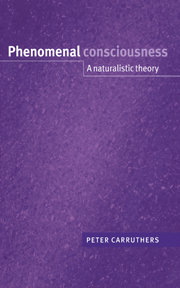Book contents
- Frontmatter
- Contents
- List of figures
- Preface
- 1 Assumptions, distinctions, and a map
- 2 Perspectival, subjective, and worldly facts
- 3 Explanatory gaps and qualia
- 4 Naturalisation and narrow content
- 5 First-order representationalism
- 6 Against first-order representationalism
- 7 Higher-order representationalism: a first defence
- 8 Dispositionalist higher-order thought theory (1): function
- 9 Dispositionalist higher-order thought theory (2): feel
- 10 Phenomenal consciousness and language
- 11 Fragmentary consciousness and the Cartesian theatre
- Conclusion
- References
- Author index
- Subject index
8 - Dispositionalist higher-order thought theory (1): function
Published online by Cambridge University Press: 30 September 2009
- Frontmatter
- Contents
- List of figures
- Preface
- 1 Assumptions, distinctions, and a map
- 2 Perspectival, subjective, and worldly facts
- 3 Explanatory gaps and qualia
- 4 Naturalisation and narrow content
- 5 First-order representationalism
- 6 Against first-order representationalism
- 7 Higher-order representationalism: a first defence
- 8 Dispositionalist higher-order thought theory (1): function
- 9 Dispositionalist higher-order thought theory (2): feel
- 10 Phenomenal consciousness and language
- 11 Fragmentary consciousness and the Cartesian theatre
- Conclusion
- References
- Author index
- Subject index
Summary
I have argued that some form of higher-order representational (HOR) theory of phenomenal consciousness is to be preferred to any more modest first-order (FOR) approach. Any HOR theory can provide a plausible account of the distinction between conscious and non-conscious experience; and all can be qualia-irrealist (in the strong sense of ‘qualia’ distinguished in chapter 1:3.4) while explaining our temptation to believe in qualia. It remains to adjudicate between the different forms of HOR account. In the present chapter I shall deploy a variety of functional and evolutionary considerations to argue that dispositionalist higher-order thought (HOT) theory is greatly preferable to both actualist HOT theory, on the one hand, and to higher-order experience (HOE) theory on the other.
Higher-order experience (HOE) theory
In the present section I shall critically examine higher-order experience (HOE) theories, of the sort defended by Armstrong (1968, 1984) and Lycan (1987, 1996). I shall argue that they are functionally and evolutionarily implausible by comparison with higher-order thought (HOT) accounts.
HOE theories are ‘inner sense’ models of phenomenal consciousness. They postulate a set of inner scanners, directed at our first-order mental states, which construct analog representations of the occurrence and properties of those states. According to HOE theorists, just as we have systems (the senses) charged with scanning and constructing representations of the world (and of states of our own bodies), so we have systems charged with scanning and constructing representations of some of our own states of mind.
- Type
- Chapter
- Information
- Phenomenal ConsciousnessA Naturalistic Theory, pp. 210 - 235Publisher: Cambridge University PressPrint publication year: 2000



